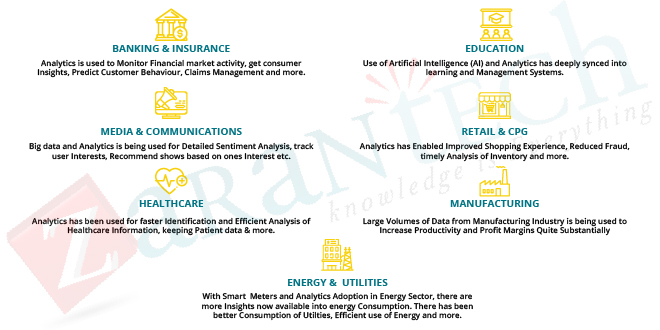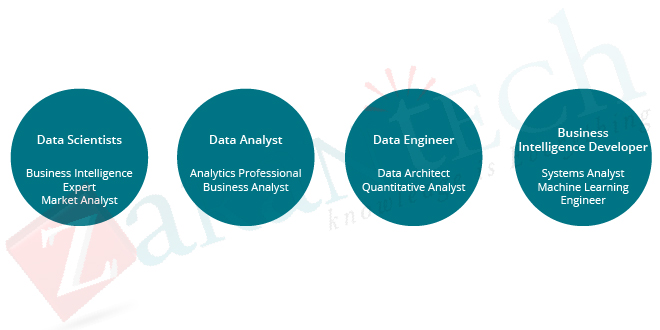A Complete Guide To Data Science Career Path
Category: Data Science Posted:Jul 27, 2020 By: Alvera Anto
India is rising and shining bright when it comes to adopting new and rising technologies. Enterprises from nearly all major industry verticals are employing data science specialists to help them accumulate actionable insights from big data. The analytics market has seen a sharp increase in demand for highly-skilled experts who understand both the business world and the tech world. Organizations today are on a consistent search for such specialists who can fill this ever-growing lack in terms of skill sets.
The stark truth, nevertheless, is that there is a lot of confusion regarding this career amongst aspiring professionals. Discussion forums, articles, and blogs have lots of queries where these applicants and job hunters want to recognize what it takes to become a data science professional.
The Goal of this Guide
The concept behind preparing this guide is to inform and enlighten data science aspirants regarding how their career trajectory would be in the future. From what kind of skills they need to equip themselves with, to the kind of job experience-level they require to accomplish to apply for specific work– this guide will cover all of this. This is a one-stop-guide indicated to give a hawk-eye sight of a prospective job trajectory in the rising technology field– particularly for the functions of Data Scientist, Data Analyst, Data Architect, and Business Intelligence Developer.
Here, the aspirant will get an idea of the types of tools, skills, and capacities he/she must gear up himself/herself with before going into the workforce.
Who is a Data Scientist?

The term data scientist is used rather loosely– from analysts to data visualizers and business intelligence experts– all are being labeled as data scientists. While this loosened net of a definition is not incorrect, a data scientist can essentially be specified as a person who is a component mathematician, part Computer Scientist, and part business trend watcher and can straddle both IT and business worlds.
Data Science is currently being included with sectors across all industries. That’s why not only are the data scientists expected to have a wider collection of skills, but the employers also expect much more cohesive specialization and partnership.
Career Trajectory Of A Data Science Expert

Various data science applicants have difficulty in identifying data science jobs and evaluating if their skills match the job summary. Because of the reality that this is a fairly nascent market, a lot of organizations are instead fluid and creative when it involves designations and professional paths. This is also because there is no clear priority about these titles.
Career Prospects
Data Science is considered among the most financially rewarding work in the market now. With numerous openings spanning throughout all fields, data science jobs are revealing only the indications of development. As more and more companies are embracing data science, firms are employing data scientists by crowds. However, despite India being a frontrunner in technical education and research study, the demand-supply gap for data science jobs and applicants is only increasing.
At this point in the analytics community, 70% of the job posts in this market are for data scientists with less than 5 years of job experience.
The job trajectory for a data scientist is somewhat complex to map for different factors. Most of the middle and senior-level management, with 10-15+ years of experience, started from a software program or coding designations considering that the industry wasn’t advanced enough to include the designation of a data scientist. Nonetheless, things are changing now, and the succeeding generations of data scientists will certainly have a more clear concept of their occupation paths.
Below, let’s look at the ‘top four’ classifications and their basic synonyms for data scientists (discussed above) and trace their professional job path.
1. Data Scientist
A ‘Data Scientist’ is the jet-set in any company. That is why this classification is most sought-after by specialists nowadays. Lots of organizations utilize this designation as it’s easy for aspirants to search for and apply. Other companies use designations like “Business Intelligence Professional” or “market analyst” for the very same.
Function: American mathematician, and a computer system scientist DJ Patil, defined the duty of a data scientist as, “A distinct mix of skills that can both unlock the insights of data and tell a fantastic tale through the data.” In the contemporary office, data scientists also have to develop machine learning designs for prediction, discover patterns and fads in data, visualise data, and even join the marketing techniques.
Skillset: Stats, Mathematics, Data Modelling, Python or R programs
Other skills: Database skills, Business acumen, Visualisation/BI, Presentation abilities
Corporate ladder: The corporate ladder for a data scientist/BI expert/ Market expert would look something like the adhering to. However, it is to be kept in mind that organisations may rename some designations according to their convenience or in maintaining their corporate ladder structure. For instance, a “lead data scientist ” might be called “principal data scientist” in some organisations.
2. Data Analyst
Organizations normally use this designation to communicate that this role includes more technical knowledge. Most of its basic synonyms are “Analytics Professional” or “Business Analyst”.
Function: The role of a Data Analyst revolves around used business information to create workable insights which then the C-suite can work upon. Another fascinating fact about data analysts is that their projects usually change now and then. So for 3 months, a data analyst may be working with the advertising division, and then next they may be moved to production.
Skill set: Data Modelling, Python or R programming, Tableau
Other skills: Business acumen, Data cleansing abilities, Visualisation/BI, Presentation skills
Corporate Ladder: The corporate Ladder for a Data Analyst/Analytics Professional/Business Analyst would look something like the following. Nonetheless, it is to be kept in mind that this designation also has the adaptability for lateral movement in the direction of specific and niche functions.
3. Data Engineer
A Data Engineer is considered as the backbone of any kind of organisation. Businesses usually employ data engineers to direct their abilities towards software development. Most of its associated roles are, “Data Architect” and “Quantitative Analyst“.
Function: As a data engineer deals with the organisation’s core data architecture, they need to have a deep understanding of programming skills. In many organisations, a data architect is accountable for building data pipeline- lines and correcting the data circulation to ensure the information reaches the pertinent divisions.
Skillset: Database management, data cleaning, Python or R programming, Hadoop
Other skills: Business acumen, Database cleaning skills, Visualisation/BI, Discussion abilities
Corporate Ladder: The corporate ladder for a Data Engineer/Data Architect/Quantitative Analyst would look something like this. As this duty is more niche and central to the organization, lateral movement is uncommon. However, for the same reason, this job is one of the most unsusceptible layoffs.
4. Business Intelligence Developer
A Business Intelligence Developer in any kind of organization is thought about as a kind of a jack of all professions who essentially need to have a strong understanding of the fundamentals of analytics and the IT department in its entirety. A few of its associated job roles include “Systems Analyst” and “Machine Learning Engineer“.
Function: A Computer Scientist’s function has a lot of overlaps with crucial functions consisting of data science, programming, and data architecture, amongst others. This role has a greater impetus for technical, rather than logical abilities and requires advanced expertise of all popular machine learning techniques.
Skillset: Python or R programming, Hadoop, creating models, Notebook, Github, data modeling
Other skills: Business acumen, Visualization/BI
Corporate Ladder: The corporate ladder for a Computer Engineer/Systems Analyst/Machine Learning Engineer would certainly look something like the following. As this role has province over almost all of the various other departments, particularly digital and emerging technology, there is an excellent opportunity for lateral movement in the organization.
Next step For Aspiring Data Scientist
With data science and analytics becoming a fundamental part of a lot of organizations, the subject has drawn in huge attention among IT professionals and engineering grads.
They are keen to build a strong base in this field. The interdisciplinary application of data science, analytics, programming, and coding has brought a rise in passion among students from the STEM background, who are seeking to enhance their abilities and acquire a deep understanding of big data and its business applications.
As a matter of fact, according to a study carried out by AIM and Great Learning, 71.6% of the respondents claimed that they wish to study data science using an online setting of education and learning. The reason being the flexibility and accessibility it offers to the learning enthusiasts.
At Zarantech we offer self-paced online training for the Data Science Master program conducted by industry experts. Join us to learn from the best! If you’re looking for similarly engaging and informative blog posts, feel free to browse through our blog section. Also, share your feedback and inputs in the form of comments.





 99999999 (Toll Free)
99999999 (Toll Free)  +91 9999999
+91 9999999